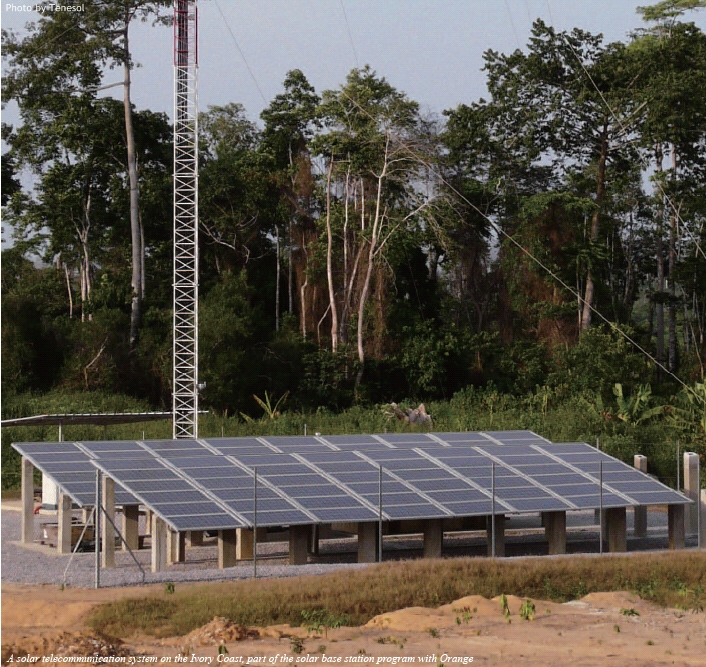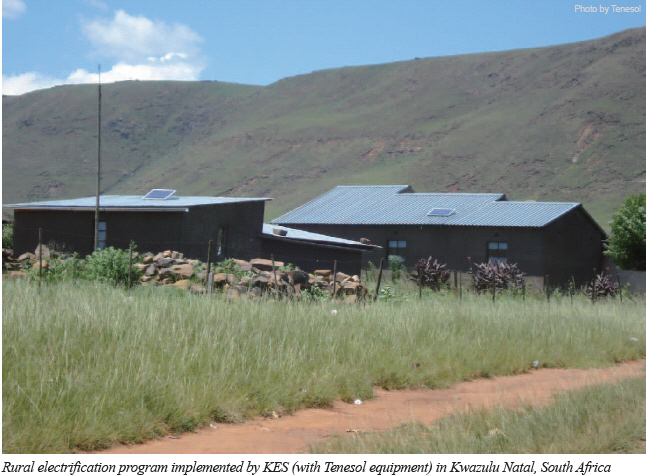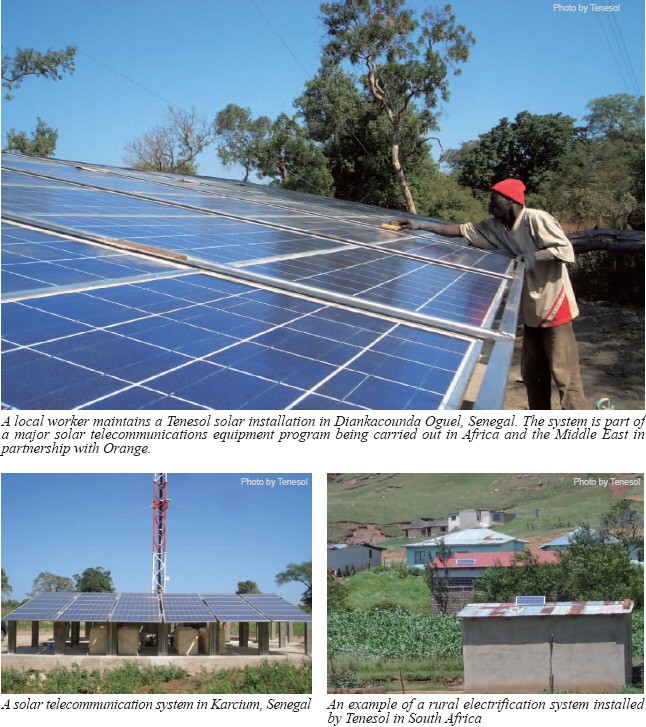
By Ronan Cloud
 Tenesol started its business in western Africa in 1983. The company began by exploring the use of Photovoltaic (PV) systems for the electrification of isolated communities. Since then, it has gone on to establish a global presence in the on-grid and off-grid PV market with 24 subsidiaries and two manufacturing plants in Toulouse, France and Cape Town, South Africa. Tenesol started its business in western Africa in 1983. The company began by exploring the use of Photovoltaic (PV) systems for the electrification of isolated communities. Since then, it has gone on to establish a global presence in the on-grid and off-grid PV market with 24 subsidiaries and two manufacturing plants in Toulouse, France and Cape Town, South Africa.
¡°Renewable energy is constantly developing,¡± says Benoit Rolland, Managing Director of Tenesol. ¡°New technologies and innovations allow us to harness renewable resources more efficiently and make off-grid power generation more available. Whether for business or domestic applications, solar power has emerged as the leading choice for on-site power. We continue to explore its uses and develop both grid connected and off-grid systems across the globe.¡±

Among renewable resources, solar power is regarded as the leading choice for off-grid power generation. There are a number of reasons for this. Firstly, its versatility; solar technology can be installed in almost any location--including mountains, deserts, jungles and off-shore locations--and can suit any power requirement, so long as enough PV panels are installed. Secondly, its reliability; solar systems utilize the latest technology but perform a relatively simple operation where little can go wrong. It is not uncommon for a solar installation to run for more than 25 years. Finally, solar power¡¯s ease of maintenance; with a solar system, basic maintenance ensures reliability and prolongs efficiency. A local representative can be trained to carry out system maintenance and repairs, minimizing the requirement for technician call outs.
How It Works

Off-grid solar systems are autonomous solutions that can be installed almost anywhere and are easily maintained by local people. Whether used as a stand-alone system or mixed with diesel generators as a hybrid solution, they are reliable, cost effective and versatile.
A major benefit of using solar power in remote locations is its simplicity. A typical system works by capturing solar radiation in silicium cells within the PV panel, which enable the panel to supply a direct current. This current is delivered and stored in a battery. The battery is then linked to the required equipment and supplies power as and when it¡¯s needed. A controller manages the charging and discharging of the storage batteries, monitors the production and consumption levels of the system and provides remote monitoring information for the system. The storage batteries are used to ensure power is supplied even during the hours of darkness or low levels of sunlight.
Applications
Solar power¡¯s ability to provide efficient off-grid power production means it is suitable to a wide range of applications and industries. From the oil and gas sector to telecommunications industry and from rural electrification to solar water pumping--there are literally dozens of potential applications. Here is an outline of some key industries where sunlight is powering business.

Oil and Gas
Remote locations and the oil & gas industry go hand-in-hand. Pipelines carrying these diminishing resources travel across some of the most isolated environments on the globe. In the past, power was supplied to such locations using diesel generators. But as oil prices rise and climate change continues, the need for alternative energy solutions increases. The suitability of solar energy¡¯s capabilities in the oil and gas industry, combined with the ideal climate of most oil and gas regions, means this is a fast expanding market.
For over 25 years, Tenesol has supplied customized turnkey solar solutions to the oil and gas industry at remote on- and off-shore locations. Such installations are designed to suit specific project needs and can cater for any situation regardless of location, power requirement or activity. Systems typically provide power for exploration, tracking, boring, transporting, cathodic protection (such as wellheads and pipelines), lighting, security and emergency shut-down equipment.
This type of PV installation, where supplementary access to energy is needed, is included in a company¡¯s business plan. Clients look at what different energy solutions provide, whether PV or a diesel hybrid system, and base their choice on a return on investment. The return is often what makes solar the leading choice for these off-grid systems.
Tenesol has a long-term involvement in large-scale oil and gas projects in North Africa, the Middle East and South America. In the Middle East alone, the company has delivered more than 700 solar systems to some of the region¡¯s largest oil and gas operators.
Telecoms
The importance and wide-spread use of telecoms in modern society has increased the need for telecommunication infrastructure in both remote off-grid locations and in urban areas. This has heightened the need for suitable off-grid power sources. To minimize overall energy costs and environmental impact, operators again look to the PV industry when considering their return on investment options.
Tenesol has met off-grid power demand with its award winning solar energy solutions. Tenesol supplies such installations for multiple telecommunication applications including fixed, mobile and radio operated networks; all forms of transmitting base stations including small-sized, microwave repeater and base transceiver stations that operate wirelessly; and peripheral infrastructures such as lighting, security and air conditioners.
One of Tenesol¡¯s largest telecommunication projects was carried out in partnership with French telecom giant Orange. The project proved so successful that Tenesol and Orange were awarded the ¡®Best Wireless Infrastructure Innovation award¡¯ at the ¡®Global Telecoms Business Innovation Awards 2010¡¯.
Developing new applications and new system structures to suit specific requirements has made solar power the leading choice for efficient power generation. In the world of telecoms, equipment does not require vast amounts of power so the system does not need to be very large. A solar system can be easily installed without much preparation to surrounding land and begins generating power immediately.
Power to the People

As well as its industrial uses, solar power is ideally suited to domestic applications. The most common of these is rural electrification, the process of bringing power to remote off-grid areas. According to the International Energy Association, 1,456 billion people do not have access to electricity, of which 83% live in rural areas. Tenesol set out to help this situation over 26 years ago and has since provided more than 45,000 cost effective and reliable power solutions to more than 50 countries. The solar systems are installed on rooftops or small structures and linked to people¡¯s homes. They are provided either on a turnkey basis or as self-contained PV kits, which provide all necessary components to create a small solar installation without external support.
Tenesol is currently working on a major rural electrification project in Madagascar. The ACORDS project, which is part of an EU-funded global development program, aims to improve Madagascar¡¯s rural provinces through the use of sustainable technology.
Bringing sustainable electricity to communities for the first time is a highly rewarding and challenging task. As a company, Tenesol established itself in rural electrification and we have gained the expertise and capabilities to deliver on truly life-changing projects.
Rural locations, by their very nature, are often remote. Accessing such areas carrying PV panels, storage batteries and general installation equipment can often prove difficult. The climate can also be a challenge. Tenesol draws on all its available resources and experience to reach end-user homes. On a recent project in Morocco, the company outlined a detailed transport plan using a variety of methods including journeying part of the way by donkey.
Rural electrification systems often become an indispensable element of a community. Training a local representative can be the difference between a quick fix and a lengthy technician call out. It also empowers the local community and provides them with the necessary skills to maintain and manage what is often a life-changing power source. Tenesol provides on-site training that covers system operation, maintenance and basic repairs.
Tenesol is currently working on several rural electrification projects in Madagascar and in Morocco where the company is delivering decentralized rural electrification systems to some of the country¡¯s most isolated areas.
Water from the Sun
In addition to rural electrification, solar water pumping is another on-site humanitarian application. More than a billion people worldwide do not have access to safe drinking water, according to the UN¡¯s World Water Development Report. And for many isolated communities, pumping underground water to the surface is the only way to access potable water. A simple solar installation is the ideal solution; the PV panels and storage batteries are connected to a pump that has been submerged in a borehole or well. The pump extracts the water and transports it to a water tank at surface level, ready for the local community to drink.
Tenesol began to explore the use of solar energy for water pumping in West Africa during the 1980s. Since then, it has installed more than 4,000 solar water pumping systems worldwide--pumping around 80,000m3 of water per day. The company has worked with many different organizations and charities to bring fresh, safe drinking water to rural locations and isolated communities across the globe.
Most recently, Tenesol completed its 200th solar water pumping system in Senegal. Two of the largest projects in the country involved the Ministry of Social Development and the CILSS (Interstate committee for the fight against drought in Sahel). Tenesol delivered 80 solar pumping systems for the CILSS¡¯s Regional Solar Program, which uses solar energy as a tool for regional development. It also provided 72 solar pumping systems for the Ministry of Social Development¡¯s PLCP project, which aims to combat poverty throughout Senegal.
Elsewhere, Tenesol is also about to start working on a major water pumping project at five remote villages in Madagascar. Solar systems will provide clean drinking water to the local community and children, in particular.
Solar power¡¯s ability to adapt to almost any environment and suit almost any requirement means its use in remote off-grid locations--whether for industrial or domestic purposes--will continue to grow. As the technology continues to improve, new applications will be developed that further its potential as the leading source of off-grid power production.
Having studied English Literature at university, Ronan Cloud pursued a career in writing. His work has been used in B2B magazines and websites around the world. His skill set focuses on energy, construction and water industries.
For more information, please send your e-mails to pved@infothe.com.
¨Ï2011 www.interpv.net All rights reserved.
|



